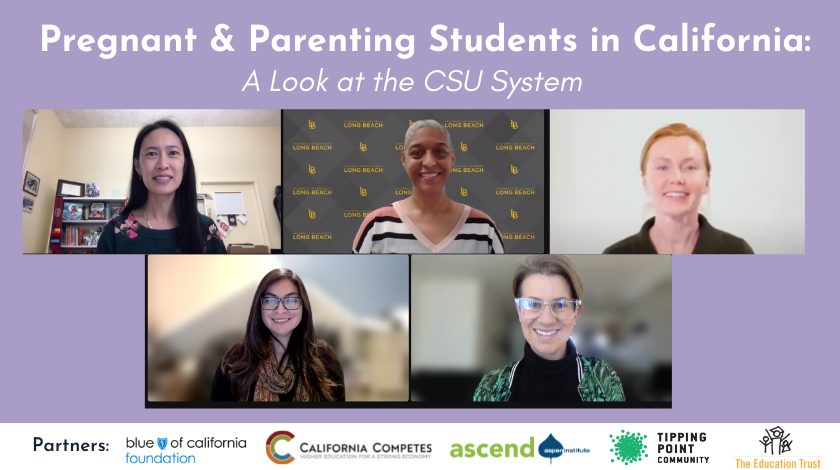By Miguel Leon
How is the CSU serving pregnant and parenting students? Who are these students and how are they being reached? How are their voices being heard and incorporated into equity work across the state? These are questions the Michelson 20MM Foundation, in partnership with Ascend at the Aspen Institute, Blue Shield of California Foundation, California Competes, The Education Trust-West, and Tipping Point Community sought to answer during Parenting Students in California: A Look At The CSU System. Part one of a three-part virtual learning series, this conversation presented a landscape analysis of the California State University system.
To kick off the conversation, Alya Michelson, Michelson 20MM Foundation co-chair, reminded us that unfortunately, 52% of student parents leave college without completing their degree. More likely to be people of color, older, women, low income, and first-generation college students, they often don’t feel welcome on campus. According to Dr. Tina Cheuk, “Student parents are data invisible, the data [pertaining to parenting students] is in different places, it’s decentralized and if we don’t know how many students we have it gives institutions excuses to not invest resources in this student population,” a fact that points to systemic issues that require systemic solutions.
Systemic Challenges to Helping Student Parents
Dr. Cheuk and Pamela Lewis presented findings from their own landscape analyses at California Polytechnic State University and California State University, Long Beach. Through their research, Dr. Cheuk and Pamela found that work centered on student parents varies across higher education campuses. Some campuses have physical spaces that house parenting students support services, while others depend on a grassroots effort led by one person or one department without dedicated space. Such support services include lactation spaces, childcare, priority parking, diaper banks, family friendly study spaces, and food pantries; however, they aren’t centralized and students often don’t know where they’re located or that they even exist.
Given these challenges and the intersectionality of student-parent identity, there is a tremendous need to apply a holistic approach, including treating them as an equity group because they sit at the intersection of many inequity categories. “They’re worried about transportation resources, financial hardship, time management, impostor syndrome, job security after graduation, the fear of failing, and being discriminated against for having a child,” Pamela shared.
For these reasons our panelists agreed that we need to call on higher education systems to collect campus-wide and system-wide data on parenting students, enabling them to tap into funding sources that are critical for this student population. In addition, we need to publicly recognize student parents as part of higher education systems, involve them in this work, and take action to support them. As Dr. Mercado Lopez stated, “We have a lot of work to do to move faculty and staff and leaders from student parent awareness to student parent competency, and even further to student parent servingness.”
Helping Student Parents is a Moral Imperative
To do just that, Dr. Cheuk and Pamela presented their Belonging and Thriving Framework that seeks to address five pillars of work that support parenting student success. These include community, healing, self determination, mutual power, and shared access to opportunities. As part of their framework, they presented recommendations to policymakers, faculty and staff members, and even student parents. The recommendations include the following:
For policymakers and decision makers:
- Gather timely and accurate data.
- Take a holistic approach that centers pregnant and parenting students and enables a culture shift toward more family friendly campuses.
- Make visible the vibrant and resilient lives of pregnant and parenting students while investing in a two-generation model for the future of California.
For staff and faculty:
- Advance policies and accommodations that provide shared access to opportunities.
- Recognize and uplift narratives.
- Support community and healing efforts.
For parenting students:
- Know that you’re not alone.
- Build community.
- Know your rights.
As Dr. Mercado Lopez stated, “If we really want to live up to our mission as a public good and if we want to democratize higher education and aspire for an educated and empowered citizenry, we have to believe that recruiting and supporting student parents is not only our responsibility but our moral imperative”.
If you would like to learn more and join the groundswell in California focused on helping pregnant and parenting students succeed, we invite you to view the recording on our YouTube channel, read the full transcript, and access additional resources mentioned during the event.
Michelson 20MM is a private, nonprofit foundation seeking to accelerate progress towards a more just world through grantmaking, operating programs, and impact investing. Co-chaired and funded by Alya and Gary Michelson, Michelson 20MM is part of the Michelson Philanthropies network of foundations.
To sign up for our newsletter, click here.
